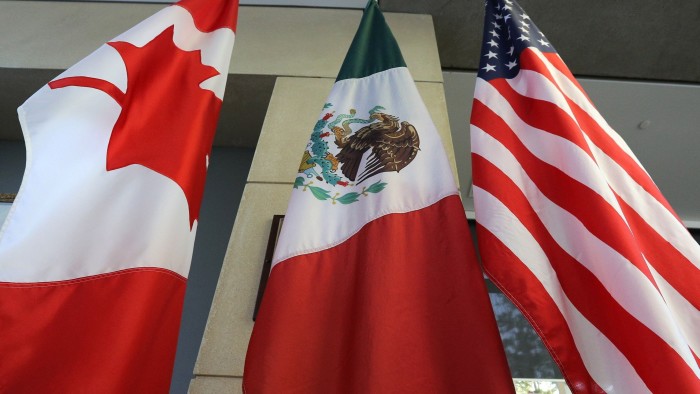President Donald Trump’s tariffs on Canada and Mexico sparked panic and condemnation from the US’s top trading partners, who said the levies would devastate North America’s economy and wreck an 80-year pact.
Politicians, business leaders and trade associations in all three countries reacted with disbelief, warning the tariffs would bring inflation, supply chain disruption and widespread job losses.
On Saturday afternoon, Donald Trump signed an executive order imposing across-the-board 25 per cent tariffs on Canadian and Mexican goods starting on Tuesday and 10 per cent tariffs on energy. He also imposed an additional 10 per cent tariff on goods from China.
Trump said the levy would be placed on goods from Canada and Mexico to “hold them accountable” for promises to halt illegal drug and migration flows into the US.
Mexico’s President Claudia Sheinbaum announced tariffs on US goods in retaliation, while Canadian Prime Minister Justin Trudeau was expected to do the same later on Saturday.
The new trade barriers would slow growth and accelerate inflation in all three countries for the next few years, with the biggest shocks for Mexico and Canada, economists at the Peterson Institute for International Economics estimated.
They will also upend decades of deepening integration in North America. Mexico and Canada send more than three-quarters of their exports to the US, underpinned by a three-way trade agreement, USMCA, signed during Trump’s last presidency.
“Tariffs will drastically increase the cost of everything for everyone: every day these tariffs are in place it hurts families, communities, and businesses,” Candace Laing, president of the Canadian Chamber of Commerce said.
US companies with operations across the region will be affected. The US Chamber of Commerce said the tariffs would disrupt supply chains.
Trump has long focused his ire on the US southern border with Mexico, but he made clear in the executive order that he sees Canada as part of the problem.
“Criminal networks are implicated in human trafficking and smuggling operations, enabling unvetted illegal migration across our northern border,” the executive order states.
Xavi Delgado of the Canada Institute at the Wilson Centre in Washington DC said the US never told Canada what actions it must take at the northern border.
“The president can only implement tariffs through the IEEPA [International Emergency Economic Powers Act] in response to an ‘unusual and extraordinary threat.’ Even if the White House believes that its trade deficit with Canada is unfair, that does not constitute an extraordinary threat; a crisis at the northern border, as they are describing it, would,” he said.
Leaders in Mexico’s private sector said there was panic and deep nervousness after Trump’s announcement. Many had hoped the country would benefit from a second Trump term, with few believing he would follow through on his threats.
Pedro Casas Alatriste, director of the American Chamber of Commerce in Mexico, said the tariffs were a step back for a relationship built over decades.
“The companies and consumers of the three economies will suffer consequences if this measure isn’t reversed; [it means a] rise in costs for producers and exporters, loss of jobs, inflation and less purchasing power for our families,” he said.
Mexico’s economy is already slowing and is expected to fall into a recession if the tariffs are imposed for a substantial period. Tiff Macklem, governor of the Bank of Canada, has said US tariffs would also likely put Canada in a recession.
“The only winners from the imposition of tariffs against Mexico and Canada by the United States are North America’s main competitors,” Kenneth Smith, a Mexican former trade negotiator said, adding that it damaged US credibility as a trading partner.
Mexicans were shocked by the language used in the White House fact sheet on the tariffs, which accuses Sheinbaum’s government directly of having an “intolerable alliance” with the country’s drug cartels. It was not clear what Mexico could do to have the tariffs removed.
Since Trump was elected and started threatening tariffs in November, Canadian and Mexican delegations have been trying to convince the president that such measures would also hurt the US economy.
Some of Trump’s fellow Republicans have also raised concerns about the president’s tariff announcement, highlighting Canada was their main trading partner.
John Llewelyn, partner at Independent Economics, a consultancy, and a former economist at the OECD, said that the main consequence of the tariffs would be inflation, with all countries likely to get hurt, including the US.
“The 80-year era of stability in the rules and conduct of economic and financial relations between countries ended today,” he said.







